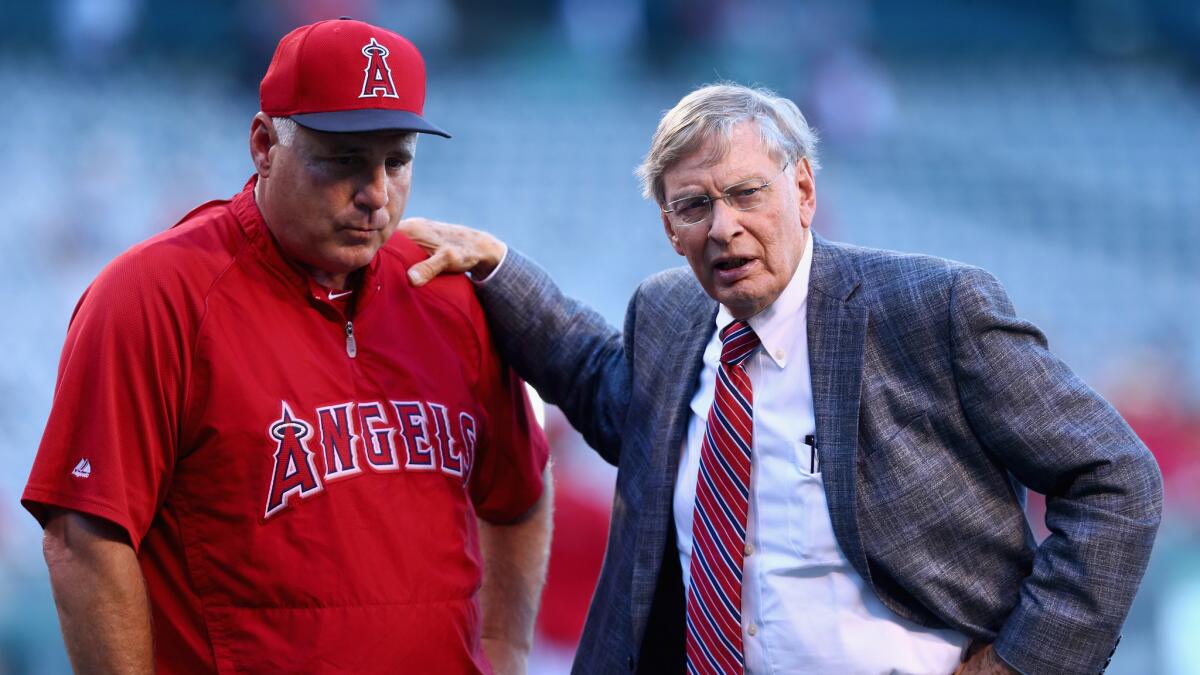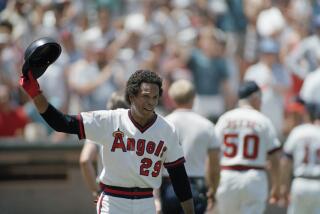Bud Selig farewell tour stops in Anaheim

Bud Selig’s victory lap around Major League Baseball paused in Anaheim on Wednesday, where the commissioner addressed a group of Angels employees before meeting with the media.
Selig sat behind a table draped with festive red, white and blue bunting and topped with a flower arrangement, which left the news conference feeling something like a celebratory funeral.
“I hope it isn’t mine,” Selig said, jokingly.
But as baseball’s second-longest-serving commissioner prepares for his January retirement after 22 years on the post, he betrayed few regrets.
“Yes it’s a tough job. And yes there have been a lot of tough days,” he said. “But that’s part of life. To me it’s been a privilege to be this generation’s commissioner and guardian of the sport.
“Obviously, I’m a fan and still watch a lot of games, go to a lot of games, do a lot of things.”
Selig, 80, said he plans to write a book and teach history at Marquette, the University of Wisconsin Madison and at a school in Arizona. As for his legacy, he says he’ll let historians determine that. He said the thing he was most proud of is the economic reformation he ushered in, one that led to both unparalleled competitive parity, labor peace and record economic benefits for the owners and players.
Under Selig’s tenure, yearly income quadrupled to nearly $9 billion and annual attendance topped 79 million. He also presided over realignment, revenue sharing and two rounds of playoff expansion.
But he was also commissioner in 1994, when a players strike scraped the World Series, and during the steroid era, which continues to darken the sport.
Selig said one of his fondest memories was Cal Ripken Jr. breaking Lou Gehrig’s record of playing in 2,130 consecutive games, which came in 1995, less than a year after the canceled World Series.
“It really helped the beginning to bring baseball back,” he said. “It was one of those things that you just are really proud to be part of.”
He also takes special pride in his role in retiring Jackie Robinson’s No. 42 in 1997, the 50th anniversary of Robinson breaking baseball’s color line.
“Understanding that Jackie Robinson coming to Major League Baseball was its most powerful and important moment. And to be able to retire that number, it really led to a lot of wonderful things,” Selig said.
Selig said he would always look back fondly at his time in the game, first as owner of the Milwaukee Brewers and later as the sport’s commissioner, but had no plans to come back.
“I’m looking forward to my retirement,” he said. “I don’t mind telling you that.”
More to Read
Get our high school sports newsletter
Prep Rally is devoted to the SoCal high school sports experience, bringing you scores, stories and a behind-the-scenes look at what makes prep sports so popular.
You may occasionally receive promotional content from the Los Angeles Times.







